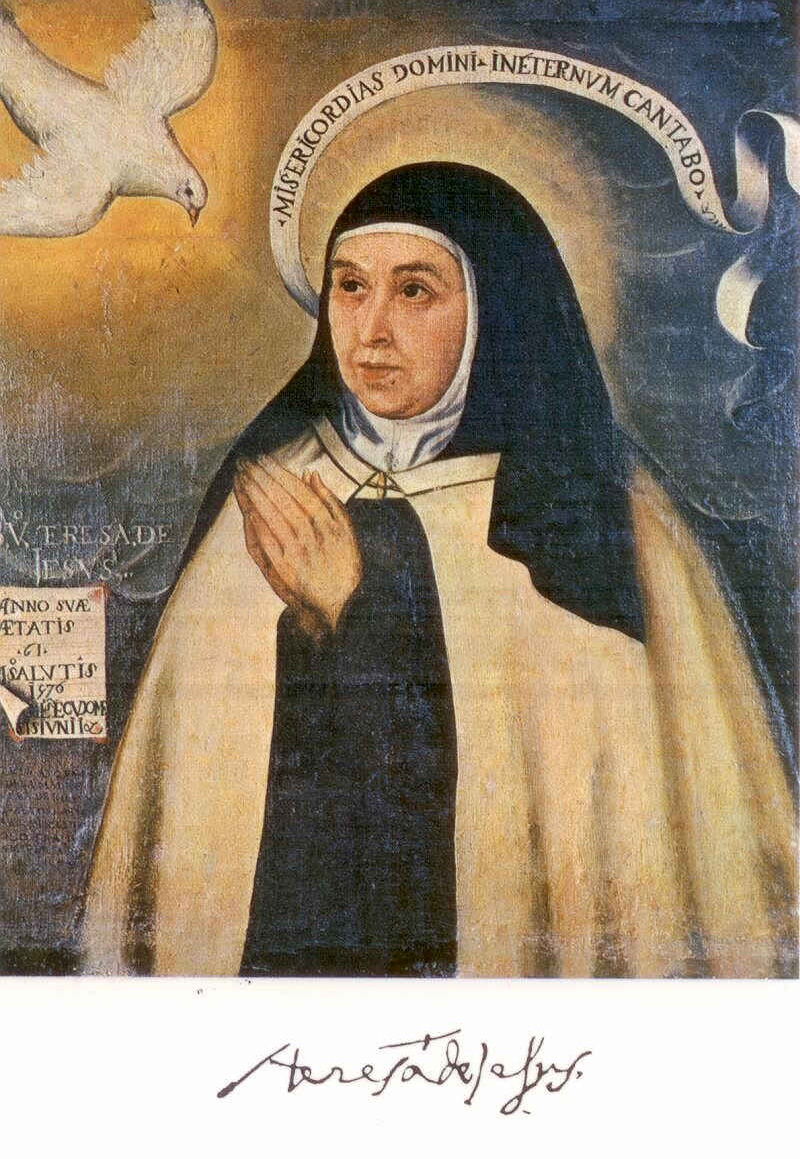Teresa de Ávila Frases famosas
“A humildade é caminhar na verdade.”
Teresa de Ávila citada em "Santa Teresinha de A a Z" - Página 81 http://books.google.com.br/books?id=GMEa4tK1fskC&pg=PA81, Patrício Sciadini - Edicoes Loyola, 1996, ISBN 8515013975, 9788515013975 - 167 páginas
Atribuídas
“Senhor, morro filha da Igreja.”
Señor [...] muero hija de la Iglesia
Fonte: "Diccionario de los Santos"; Por Claudio Leonardi, Andrea Riccardi, G. Zarri; Colaborador Claudio Leonardi; Publicado por Editorial San Pablo, 2000; ISBN 842852257X, 9788428522571; 2272 páginas; books.google http://books.google.com.br/books?id=a2WMi-KVQNkC&pg=PA2102&dq=%E2%80%9CMuero+hija+de+la+Iglesia%E2%80%9D&lr=&client=firefox-a#PPA2102,M1, página 2102
Teresa de Ávila: Frases em inglês
Variante: The important thing is not to think much, but to love much.
Fonte: The Life of St. Teresa of Jesus (c.1565), Ch. XXV. "Divine Locutions. Discussions on That Subject" ¶ 26 & 27
Variant translation: I do not fear Satan half so much as I fear those who fear him.
Fonte: The Life of Saint Teresa of Ávila by Herself
Contexto: May it please His Majesty that we fear Him whom we ought to fear, and understand that one venial sin can do us more harm than all hell together; for that is the truth. The evil spirits keep us in terror, because we expose ourselves to the assaults of terror by our attachments to honours, possessions, and pleasures. For then the evil spirits, uniting themselves with us, — we become our own enemies when we love and seek what we ought to hate, — do us great harm. We ourselves put weapons into their hands, that they may assail us; those very weapons with which we should defend ourselves. It is a great pity. But if, for the love of God, we hated all this, and embraced the cross, and set about His service in earnest, Satan would fly away before such realities, as from the plague. He is the friend of lies, and a lie himself. He will have nothing to do with those who walk in the truth. When he sees the understanding of any one obscured, he simply helps to pluck out his eyes; if he sees any one already blind, seeking peace in vanities, — for all the things of this world are so utterly vanity, that they seem to be but the playthings of a child, — he sees at once that such a one is a child; he treats him as a child, and ventures to wrestle with him — not once, but often.
May it please our Lord that I be not one of these; and may His Majesty give me grace to take that for peace which is really peace, that for honour which is really honour, and that for delight which is really a delight. Let me never mistake one thing for another — and then I snap my fingers at all the devils, for they shall be afraid of me. I do not understand those terrors which make us cry out, Satan, Satan! when we may say, God, God! and make Satan tremble. Do we not know that he cannot stir without the permission of God? What does it mean? I am really much more afraid of those people who have so great a fear of the devil, than I am of the devil himself. Satan can do me no harm whatever, but they can trouble me very much, particularly if they be confessors. I have spent some years of such great anxiety, that even now I am amazed that I was able to bear it. Blessed be our Lord, who has so effectually helped me!
Fonte: Interior Castle
“Accustom yourself continually to make many acts of love, for they enkindle and melt the soul.”
Maxim 52, p. 259
Maxims for Her Nuns (1963)
Fonte: Complete Works St. Teresa Of Avila, Volume III
Fonte: The Life of Saint Teresa of Ávila by Herself
“Never exaggerate, but express your feelings with moderation.”
Maxim 13, p. 256
Maxims for Her Nuns (1963)
The Book of Positive Quotations (2007) edited by John Cook, Steve Deger, and Leslie Ann Gibson, p. 333
“Reflect upon the providence and wisdom of God in all created things and praise Him in them all.”
Maxim 35, p. 258
Maxims for Her Nuns (1963)
“To have courage for whatever comes in life — everything lies in that.”
As quoted in The Little Lamp (1981) by Eknath Easwaran, p. 80
Fonte: The Life of St. Teresa of Jesus (c.1565), Ch. XXV. "Divine Locutions. Discussions on That Subject" ¶ 24
“Never compare one person with another: comparisons are odious.”
Maxim 44, p. 259
Maxims for Her Nuns (1963)
Fonte: The Life of St. Teresa of Jesus (c.1565), Ch. I "Childhood and early Impressions" ¶ 4
Fourth Mansions, Ch. 3: Prayer of Quiet, as translated by the Benedictines of Stanbrook (1911), revised and edited by Fr. Benedict Zimmerman
Interior Castle (1577)
